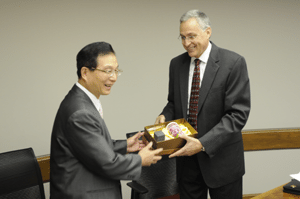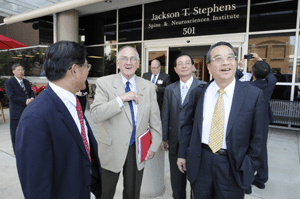Taiwanese Education Officials Visit UAMS Campus
| 
Ching-Ji Wu, minister of the Taiwan Ministry of Education, and Chancellor Dan Rahn exchanged gifts during the visit.

A tour of the UAMS campus was a highlight of the Taiwanese delegation’s visit.
Sept. 8, 2011 | After a tour of the University of Arkansas for Medical Sciences (UAMS) campus, top education officials from Taiwan told UAMS leaders they want to open their country to more student and faculty exchanges.
Meeting in the UAMS board room on Aug. 30, UAMS Chancellor Dan Rahn, M.D., asked the Taiwanese delegation about their primary goals.
“We want to strengthen the educational and cultural relations with the United States,” said Dr. Ching-Ji Wu, minister of the Taiwan Ministry of Education.
“Our interactions have a lot to do with health policy as much as higher education,” Rahn said. “If we agree on shared goals we can set up student exchanges and potentially short-term faculty exchanges. That’s the way people begin to know each other.”
The Taiwan delegation included Dr. Tony W.T. Lin, director general of the Taiwan Bureau of International Cultural & Educational Relations, and the presidents of four Taiwanese universities.
“We have teachers from China teaching Mandarin in other countries,” Lin said. “If you need teachers we would like to cooperate. We have very qualified Chinese teachers.”
Other UAMS leaders attending the hour-long discussion included College of Medicine Dean Debra Fiser, M.D., College of Pharmacy Dean Stephanie Gardner, Pharm.D., College of Public Health Dean James Raczynski, Ph.D., and Richard Pierson, vice chancellor for Clinical Programs.
The delegation’s tour of UAMS included the Jackson T. Stephens Spine & Neurosciences Institute and the Winthrop P. Rockefeller Cancer Institute.
UAMS became a destination for the group after Rahn and other UAMS officials visited Taiwan earlier this year. The UAMS delegation visited Kaohsiung Medical University in Kaohsiung City, Taiwan, and renewed a 30-year-old exchange agreement between the universities. They also spent a day in Taipei City, where the Ministry of Education is headquartered.
Gardner said she and her counterpart at Kaohsiung discussed opportunities for student exchanges. She said the idea is to have UAMS students go to Taiwan during the summer break to learn the language well enough to function there, then the students could take classes that would be taught in English.
Students from her college could benefit by learning about medicinal plants and other pharmaceutical treatments not taught at UAMS. Students visiting from Taiwan could benefit by the clinical experience at UAMS.
Researchers in the College of Pharmacy are also interested in collaborating with Taiwanese researchers, particularly in radiation health, Gardner said.
Raczynski said his college is interested in pursuing opportunities that may exist, particularly in the area of regulatory science.
“Public health is really about global health in this day and age,” he said. “What affects people in Taiwan affects people in this country and vice versa.”